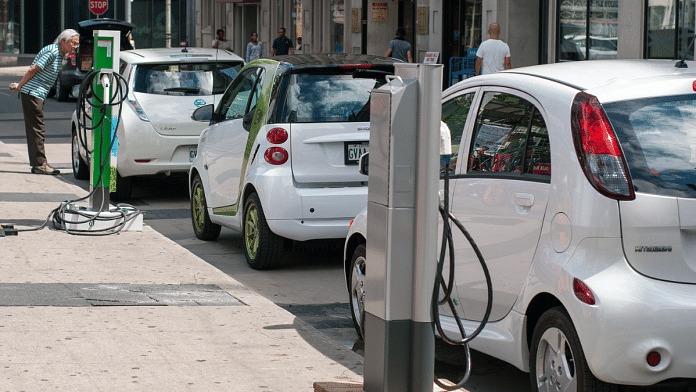Sometimes an article and its byline leave you scratching your head — you can’t seem to make a connection between the two. That is how I felt after reading Rowan Atkinson’s recent article in The Guardian about electric vehicles. The more erudite would recognise him as Blackadder from the series of the same name, but most of us know Atkinson as a comedian, and almost everyone knows him as Mr Bean.
There’s another side to Atkinson for those of us who cover the automotive industry, though — he is also a bonafide car ‘nut’. A regular at Formula One, Atkinson owns a McLaren F1, one of the rarest modern supercars today. He actually uses it instead of keeping it in a garage — and as he writes in The Guardian, he was an early adopter of both hybrid and battery-electric technology.
Atkinson goes to on say that he is immensely qualified to opine on the matter not because he ‘knows cars’ but because he is actually an electrical engineer with a postgraduate degree in control systems. (The things one learns every day!) His The Guardian column got me thinking just how right he is about the automotive industry, and how pertinent his expertise is to India.
He correctly argues that we should not treat the automotive industry like the fast fashion industry. That is, using a new car for a few years and then simply discarding it. Though the entire automotive industry acknowledges that emissions are a problem, manufacturing vehicles is a major problem too — it leaves a vast carbon footprint as well.
And making new EVs is an even bigger problem.
Atkinson is right in saying that mining, refining, and processing the metals needed for electric car batteries are much more carbon-intensive procedures than making a petrol vehicle. A 2021 study by Swedish carmaker Volvo estimated that this process released 70 per cent more carbon emissions as compared to manufacturing an internal combustion engine (ICE) car.
As I wrote in these columns about the rather poor suggestion by an Indian government committee to ban diesel cars, policymakers have wilfully ignored the problem of the high environmental costs of EVs.
Also read: Why a subsidy cut on electric two-wheelers isn’t such a bad thing
India has got it worse
Worse still, in India, we have codified carbon intensity in vehicular ownership. Here, vehicle registration lasts for only 15 years, and if you are unfortunate enough to own a diesel vehicle in Delhi and the National Capital Region (NCR), it lasts for only 10. Minister of Road Transport and Highways Nitin Gadkari talks very impressively about how his new scrappage policy will help in recycling cars. But the most environmentally friendly thing one can do with any vehicle is to run it as long as possible.
The premature death of ICE vehicles means that the energy-intensive and environmentally destructive process of mining iron ore, making steel (cars tend to use virgin steel), plastic, and even manufacturing the car, no matter the many improvements in processes like painting, — all have a huge environmental cost.
You probably don’t expect your modern car to last as long as your grandfathers’ Hindustan Ambassador. But is that entirely true? A well-maintained, lightly-used private car can easily last for 20-30 years. While an older vehicle might have higher tailpipe emissions than a brand-new vehicle, the energy required to produce the latter emits tons of carbon dioxide and other pollutants. Therefore, one must consider lifetime emissions just like they ought to consider the ‘total cost of ownership’ (looking at service and running costs in addition to the sticker price) of a vehicle.
It is generally advisable to buy more electric vehicles for obvious reasons. But the recent apocalyptic scene in New York (the entire city was blanketed under a thick layer of smoke drifting from Canadian wildfires) and Delhi pollution (caused by construction activities and stubble burning) show that vehicles aren’t always to blame.
Also read: EV landscape has changed since Tesla first knocked on India’s door. New challenges await…
Overhaul the PUC process
If you must buy a new car because your old one has given up or lacks modern safety features, choosing an electric or hybrid vehicle makes sense. After all, it’s the most that you, as an average citizen, can do for the environment.
But if the government cares about the environment, the best thing that it can do is to drastically overhaul the Pollution Under Control (PUC) process for vehicles, which has become a joke due to corrupt practices. Moreover, it must allow vehicles, from two-wheelers to cars and trucks, to run for as long as possible, provided they meet pollution norms.
Andy Palmer, the former engineering chief at Nissan and currently heading Switch Mobility, the electric arm of the Hinduja-owned Ashok Leyland, said in a tweet that there are multiple ways to achieve carbon neutrality and emissions control in the vehicular operations process. The notion that battery-powered vehicles are the answer is bizarre and stupid. It is high time that policymakers and the judicial system in India — it was the Supreme Court that enforced the 10-year registration window in Delhi NCR in 2018 — realise this too. And, of course, there is the anxiety of being completely dependent on China for the EV ecosystem.
In order to achieve a very lofty goal, we might just have shot ourselves in the foot.
@kushanmitra is an automotive journalist based in New Delhi. Views are personal.
(Edited by Humra Laeeq)



